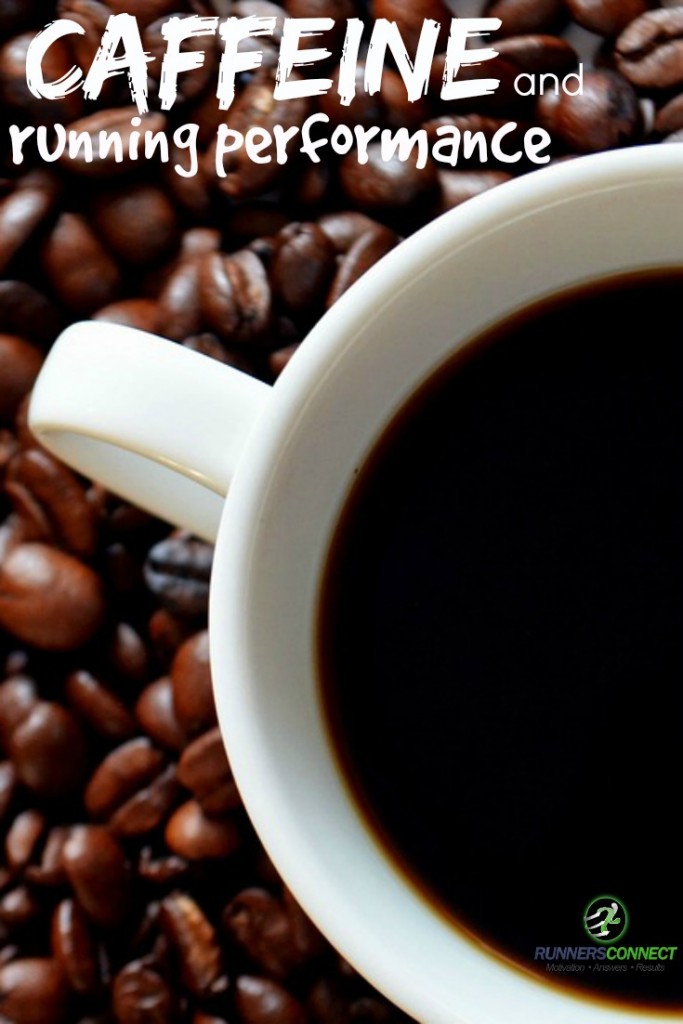 An ergogenic aid is any substance that that claims to improve one’s work output or capacity to exercise.
An ergogenic aid is any substance that that claims to improve one’s work output or capacity to exercise.
Many ergogenic aids come in the form of dietary supplements with claims that vary from fat burning and losing weight, to increasing strength and improving endurance and performance.
Athletes work very hard to reach the top of their sport and even a slight advantage can make a difference, so any product that can give them an edge is compelling. However, only a very small handful of ergogenic aids has the evidence to support the claims.
Caffeine is one product that actually does enhance your running performance, to a degree. And, for the most part, it is legal for use in sport.
The research on caffeine to enhance your running performance
A large number of research studies conducted with endurance-trained athletes have shown that caffeine can improve endurance performance in events lasting for an hour or longer, particularly by increasing time to exhaustion while exercising at the same intensity level.
Caffeine’s running performance enhancement occurs through a number of mechanisms.
- First, and probably most significant, is caffeine’s effect on perception of effort during exercise. In studies, athletes who exercise with caffeine report that the exercise feels easier and that they can exercise longer before feeling fatigued.
Caffeine is a drug that acts as a central nervous system stimulant. Therefore, caffeine plays a role in helping you feel more alert and delaying mental fatigue. Caffeine also antagonizes the neurotransmitter adenosine, allowing for an increase in certain “feel good” neurotransmitters like epinephrine, serotonin and dopamine, which are suggested to contribute to the feeling of “runner’s high”.
- Another mechanism of action thought to play a role in endurance exercise involves caffeine’s effect on fatty acid metabolism. Caffeine increases the mobilization of fatty acids from fat and muscle, increasing fat utilization and thus decreasing the reliance on glycogen as a fuel source. While this seems like it would have a significant effect on performance, research has not shown much support for this theory and suggests that any glycogen sparing effect would be minimal and a chronic high-carbohydrate diet would have a greater effect.
How significantly does caffeine enhance your running performance?
It is unclear how much each mechanism of action contributes to actual performance enhancement but a review 21 studies measuring the effects of caffeine on endurance performance reported and average improvement of 3.2 +/- 4.3 percent (some studies showed improvements as large as 17.3 percent).
Improvements of this degree are not considered drastic, but they are significant and in sports where even tenths of seconds can make a difference between first and second place, any slight improvement is valuable.
For example, a 3 percent improvement from an 18:00 5k would be a 17:28 5k.
How much caffeine is recommended?
The majority of studies reviewed suggest that a dose of caffeine between 3-6 mg/kg of body weight produces the optimum effect. Doses any higher than 6 mg/kg have not been shown to produce any more of an ergogenic effect.
To put those numbers into perspective, here are the ranges for a few different body weights:
- 120 pounds: 164- 327 mg
- 150 pounds: 205-409 mg
- 180 pounds: 245-491 mg
Where to get caffeine?
While caffeine is most often consumed in liquid form through, coffee, tea, energy drinks, and other type of beverages, it can also be found in foods like chocolate, specially formulated sports gels and bars, and tablets.
The following table lists some common forms of caffeine and the average amount of caffeine each product provides.
Caffeine (mg)
Starbucks grande coffee (16 oz) 400 mg
Coffee, drip (12 oz) 150 mg
Red Bull (8 oz) 80 mg
Coke (12 oz) 35 mg
Green tea (8 oz) 35 mg
Clif Shot (mocha) 50 mg
No Doz Max (1 tablet) 200 mg
Excedrin (1 tablet) 130 mg
When should I take caffeine?
Most studies conducted had athletes consuming caffeine within 60 to 90 minutes prior to exercise. This time frame works best for athletes consuming caffeine in tablet or gel form, since drinking 12-16 ounces of hot coffee that close to competition is not always feasible.
However, depending on your body’s reaction to caffeinated beverages, it is not out of the question to get caffeine via the liquid route as well. Caffeine also has a fairly long half-life of four to six hours, so caffeine consumed up to three hours before exercise could still significantly enhance your running performance.
Is caffeine dehydrating?
It is a widespread myth that caffeine and caffeine-containing beverages have a diuretic effect, meaning they cause you to urinate more and thus increase your risk of becoming dehydrated.
Research has shown this to be untrue when consuming moderate doses of caffeine (< 400mg per day). If you find that caffeinated beverages make you urinate more, the reason is probably more related to the liquid itself and not the caffeine.
Is caffeine unhealthy in extreme weather?
Furthermore, there have been a few studies that have looked at the effect caffeine has on subjects exercising in hot and humid conditions. Findings suggest that caffeine-tolerant athletes consuming caffeine, in moderate doses, prior to exercise in heat can increase their time to exhaustion compared to athletes not consuming caffeine, therefore caffeine dose not promote dehydration or increase heat stress. However, it is still important to maintain adequate hydration throughout the exercise.
Other concerns
It should be noted that there is no research to support the safety and effectiveness of caffeine use by younger athletes (high school and younger).
Furthermore, caffeine is still a NCAA restricted substance. The NCAA’s current limit on urinary caffeine levels is 15 mg/L. This level would likely require a dose of over 9 mg/kg of caffeine, which is far higher than the recommended dosage for performance enhancement. Regardless, it is important to consider other sources of caffeine that may be in your diet and be aware that too much of any of these products could cause you to have a failed drug test.
Many studies conducted on caffeine and exercise performance have recruited athletes that are habitual caffeine consumers. In the United States, over 90 percent of the adult population consumes some form of caffeine on a daily basis. Therefore, researchers are hard-pressed to find a subset of athletes that are not regular caffeine consumers.
Some researchers suggest that habitual caffeine consumption leads to a caffeine tolerance which may dull the ergoenic effect of the drug while others have noted that abstaining from caffeine for a number of days prior to exercise has no impact on the acute effects of caffeine on performance.
My suggestion would be this: if you consume moderate amounts of caffeine on a daily basis and become irritable or lethargic without your caffeine, then the benefits to having it outweigh any possible gains in abstaining. However, if abstaining from caffeine has no negative effects on your daily life, then it is worth a shot to see if limiting its use to race day can enhance your running performance.
Negative side effects of caffeine use
Finally, keep in mind that caffeine is a drug and like other drugs it can have negative side effects and addictive properties.
- nervousness
- upset stomach
- difficult sleeping
- anxiety
- rapid heart beat
Repetitive use of high doses of caffeine can also lead to a physical dependence on the drug. At this point, withdrawal from the drug can produce the following unwanted symptoms:
- headache
- irritability
- loss of concentration
Bottom Line
Caffeine has been proven in research to be an effective performance enhancer in endurance sports. However, safety of caffeine use in young athletes has not been studied and caffeine should always be regarded as a drug that must be used responsibly.
Each individual can have different responses to caffeine and these responses can vary greatly depending on the dose. It is important for each individual to test the effect of caffeine-containing products carefully and always test them out in training before deciding to use them in competition.
References
Schubert MM, Astorino TA. A systematic review of the efficacy of ergogenic adis for improving running performance. J Strength Cond Res. 2012, August 10.
Desbrow B, Biddulph C Delvin B, Grant GD, Anoopkumar-Dukie S, Leveritt MD. The effects of different doses of caffeine on endurance cycling time trial performance. J Sport Sci. 30(2):115-120, 2012.
Skinner TL, Jenkins DG, Taaffe DR, Leveritt MD, Coombes JS. Coinciding exercise with peak serum caffeine does not improve cycling performance. J Sci Med Sport, 2012 May 31.
Bell DG, McLellan TM. Exercise endurance 1, 3, and 6 h after caffeine ingestion in caffeine users and non users. J Appl Physiol 93:1227-1234, 2002.
Irwin C, Desbrow B, Ellis A, O’Keefe B, Grant G, Leveritt M. Caffeine withdrawal and high-intensity endurance cycling performance. J Sport Sci 29(5):509-515, 2011.
Roti MW, Armstrong LE. Thermoregulatory responses to exercise in the heat: chronic caffeine intake has no effect. Aviat Space Environ Med 77(2):124-129, 2006.





One Response
Great summary of the research – I’ve read other more limited accounts of the effect of caffeine and come to largely the same conclusions (and I’ve written my own, less thorough, summary at http://predawnrunner.com/2011/12/coffee-nectar-bane-predawn-runner/). My focus was a bit more on coffee use for the rest of the day (specifically for those of us who don’t get enough sleep). I’ve long debated with my wife and mother-in-law over the diuretic properties – so I’ll once again point out this research to them the next time they bring it up.